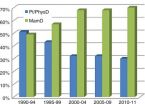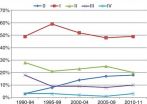(Press-News.org) OAK BROOK, Ill. – Mammography-detected breast cancer is associated with a shift to earlier stage diagnosis in older women, subsequently reducing the rate of more advanced, difficult-to-treat cases, according to a new study published online in the journal Radiology. Researchers said the findings lend support to regular mammography screening in women ages 75 and older.
The value of mammography screening in older women has been subject to much debate in recent years. The American Cancer Society recommends annual mammograms for women age 75 and older as long as they are in good health, while the U.S. Preventive Services Task Force (USPSTF) does not recommend mammography screening in this age group, citing insufficient evidence to evaluate benefits and harms.
A lack of research is chiefly responsible for the divergent recommendations, according to Judith A. Malmgren, Ph.D., affiliate assistant professor at the University of Washington's School of Public Health and Community Medicine in Seattle.
"There are no studies on women age 75 and older, despite the fact that they are at the highest risk for breast cancer," she said.
Dr. Malmgren and her research partner, Henry Kaplan, M.D., from the Swedish Cancer Institute in Seattle, recently looked at the impact of mammography detection on older women by studying data from an institutional registry that includes more than 14,000 breast cancer cases with 1,600 patients over age 75.
The majority of mammography-detected cases were early stage, while physician- and patient-detected cancers were more likely to be advanced stage disease. Mammography-detected invasive breast cancer patients were more often treated with lumpectomy and radiation and had fewer mastectomies and less chemotherapy than patient- or physician-detected cases.
Mammography detection was associated with a 97 percent five-year disease-specific invasive cancer survival rate, compared with 87 percent for patient- or physician-detected invasive cancers.
"Mammography enables detection when breast cancer is at an early stage and is easier to treat with more tolerable options," Dr. Malmgren said. "In this study, older women with mammography-detected invasive cancer had a 10 percent reduction in breast cancer disease-specific mortality after five years."
The early detection provided by mammography is particularly important in older women, Dr. Malmgren noted, because they cannot easily tolerate the chemotherapy that is commonly used to treat more advanced breast cancers.
"Longer life expectancies for women also increase the importance of early detection," Dr. Malmgren said. "A 75-year-old woman today has a 13-year life expectancy. You only need five years of life expectancy to make mammography screening worthwhile."
Dr. Malmgren acknowledged that the potential costs of mammography, such as those associated with false-positive results, are an important consideration when weighing screening benefits. However, she said that false-positive findings are less common in older women.
"It's easy to detect a cancer earlier in older women because breast density is not an issue," Dr. Malmgren said. "And mammography is not expensive, so doing it every other year would not add a lot of cost to healthcare."
The researchers hope that the study results help women and their physicians make better informed decisions about mammography, ultimately leading to lower mortality rates.
"Breast cancer survival in younger women has improved dramatically over last 20 years, but that improvement has not been seen in older women," Dr. Malmgren said.
INFORMATION:
"Improved Prognosis of Women Aged 75 and Older with Mammography-detected Breast Cancer." Collaborating with Drs. Malmgren and Kaplan were Jay Parikh, M.D., and Mary K. Atwood, C.T.R.
The study was funded by the Kaplan Cancer Research Fund and was conducted at the Swedish Cancer Institute.
Radiology is edited by Herbert Y. Kressel, M.D., Harvard Medical School, Boston, Mass., and owned and published by the Radiological Society of North America, Inc.
RSNA is an association of more than 53,000 radiologists, radiation oncologists, medical physicists and related scientists promoting excellence in patient care and health care delivery through education, research and technologic innovation. The Society is based in Oak Brook, Ill. (RSNA.org)
For patient-friendly information on mammography, visit RadiologyInfo.org.
Mammography benefits women over 75
2014-08-05
ELSE PRESS RELEASES FROM THIS DATE:
Patients with autism spectrum disorder are not sensitive to 'being imitated'
2014-08-05
A Japanese research group led by Prof Norihiro Sadato, a professor of the National Institute for Physiological Sciences (NIPS), National Institutes of Natural Sciences (NINS), has found that people with autism spectrum disorders (ASD) have decreased activity in an area in the brain critical for understanding if his/her movement was imitated by others. These results will be published in Neuroscience Research (available online at http://www.sciencedirect.com/science/article/pii/S0168010214001254).
The research group of Norihiro Sadato, a professor of NIPS, Hirotaka Kosaka, ...
Boost for cancer prevention research
2014-08-05
Queen's University scientists are helping to spearhead a new £6 million initiative to find better ways to prevent cancer.
The new initiative, led by Cancer Research UK with matching investment from the BUPA Foundation, aims to support cutting-edge research to find better ways to prevent cancer.
It is estimated that more than four in ten cancer cases could be prevented by lifestyle changes, such as not smoking, keeping a healthy body weight, cutting back on alcohol, eating a healthy diet, keeping active and staying safe in the sun.
Professor Frank Kee, who directs the ...
Research explores why interval walking training is better than continuous walking training
2014-08-05
New research published in Diabetologia (the journal of the European Association for the Study of Diabetes) suggests that training with alternating levels of walking intensity (interval training) could be better than walking at a constant speed to help manage blood sugar in people with type 2 diabetes. The research is by Dr Thomas Solomon, University of Copenhagen, Denmark, and colleagues.
The effects of exercise on blood sugar (glycaemic) control in individuals with type 2 diabetes are well documented but the optimal exercise intensity and type remains to be defined. ...
Study predicts hepatitis C will become a rare disease in 22 years
2014-08-05
Effective new drugs and screening would make hepatitis C a rare disease by 2036, according to a computer simulation conducted by The University of Texas MD Anderson Cancer Center and the University of Pittsburgh Graduate School of Public Health. The results of the simulation are reported in the August 5 edition of the journal Annals of Internal Medicine.
"Hepatitis C (HCV) is the leading cause of liver cancer and accounts for more than 15,000 deaths in the U.S. each year," said Jagpreet Chhatwal, Ph.D., assistant professor of Health Services Research at MD Anderson, and ...
Life expectancy gap between blacks and whites in the US varies considerably across states
2014-08-04
Racial differences in life expectancy have declined nationally but still vary substantially across U.S. states, according to a new study by McGill University researchers. The findings, published in the journal Health Affairs, suggest that state policies could play a key role in further reducing racial differences in mortality. The researchers calculated annual state-specific life expectancies for blacks and whites from 1990 to 2009 and found that progress was uneven across states during the past two decades.
"Prior studies in the United States have shown that, for the ...
Medical consultations for surgical patients examined amid payment changes
2014-08-04
The use of medical consultations for surgical patients varied widely across hospitals, especially among patients without complications, in a study of Medicare beneficiaries undergoing colectomy (to remove all or part of their colon) or total hip replacement (THR).
Internists and medical subspecialists are frequently called on to assess surgical patients and to help manage their care. As payers move toward bundled payments, hospitals need to better understand variations in practice and resources used during patient care.
The authors examined hospital medical consultations ...
Identifying kids, teens with kidney damage risk after first urinary tract infection
2014-08-04
Bottom Line: Children and adolescents with an abnormal kidney ultrasonography finding or with a combination of a fever of at least 102 degrees and infection with an organism other than E.coli appear to be at high risk for renal scarring with their first urinary tract infection (UTI).
Author: Nader Shaikh, M.D., of the Children's Hospital of Pittsburgh, and colleagues.
Background: UTIs are a common and potentially serious bacterial infection in young children. UTIs can lead to permanent renal scarring in up to 15 percent of cases in this population. Significant scarring ...
Study examines midlife hypertension, cognitive change over 20-year period
2014-08-04
Bottom Line: Hypertension in middle age (48 to 67 years) was associated with a greater, although still a modest, decline in cognition over a 20-year period compared with individuals who had normal blood pressure.
Author: Rebecca F. Gottesman, M.D., Ph.D., of the Johns Hopkins University School of Medicine, Baltimore, and colleagues.
Background: Evidence suggests hypertension is a risk factor for cognitive change and dementia and midlife hypertension may be the stronger risk factor.
How the Study Was Conducted: Authors used the Atherosclerosis Risk in Communities ...
Higher chance of hospital death found in areas where emergency departments have closed
2014-08-04
In the first analysis of its kind, UC San Francisco research shows that emergency department closures can have a ripple effect on patient outcomes at nearby hospitals.
In a study of more than 16 million emergency admissions to California hospitals between 1999 and 2010, researchers found that patients who were admitted to facilities located in the vicinity of an emergency department (ED) that had recently closed experienced 5 percent higher odds of dying than patients admitted to hospitals that were not near a recently closed ED.
The odds of dying were even higher for ...
Poor people with diabetes up to 10 times likelier to lose a limb than wealthier patients
2014-08-04
It's no secret that poverty is bad for your health. Now a new UCLA study demonstrates that California diabetics who live in low-income neighborhoods are up to 10 times more likely to lose a toe, foot or leg than patients residing in more affluent areas of the state. Earlier diagnosis and proper treatment could prevent many of these amputations, the researchers say.
The study authors hope their findings, published in the August issue of Health Affairs, will motivate public agencies and medical providers to reach out to patients at risk of late intervention and inspire ...




